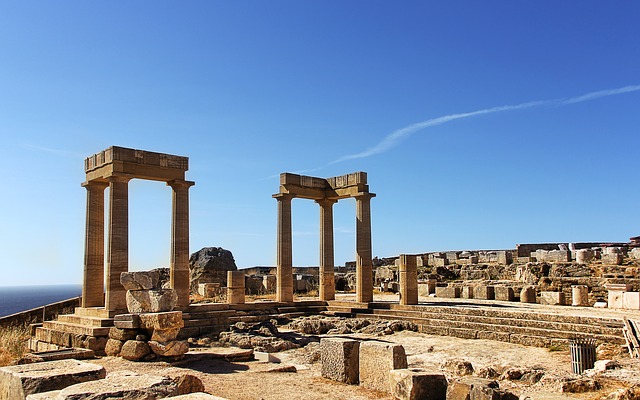Use of the conjunction “and” in Greek – Part 2 Posted by Ourania on Apr 16, 2018 in Vocabulary
Γεια σας! Last week, I posted an article about the different uses of the conjunction και. This is the second part. Enjoy!
#5. ό,τι και να/ό,τι κι αν= no matter what
Ό,τι κι αν κάνει, οι γονείς του θα τον αγαπούν. / No matter what he does, his parents will love him.
Ό,τι και να κάνει, οι γονείς του δε θα είναι ποτέ ευχαριστημένοι. / No matter what he does, his parents will never be pleased.
#6/ όχι και τόσο= not so (much)
Α: Σου αρέσει αυτή η φούστα;/ Do you like this skirt?
Β: Όχι και τόσο (όχι τόσο, is also correct)/ Not so much.
#7. ακόμα και= even / ακόμα κι αν= even if
Θα πάμε στην Ελλάδα ακόμα και χωρίς εσένα. / We will go to Greece even without you.
Θα πάμε στην Ελλάδα ακόμα κι αν δεν έρθεις. / We will go to Greece even if you don’t come.
#8. όσο και να / όσο κι αν= no matter how (much)
Όσο και να φωνάζετε, δεν θα γίνει το δικό σας. /(Literally) No matter how much (how loud) you shout, you will not have it your own way.
Όσο κι αν φωνάζεις, κανείς δε θα σε ακούσει. / (Literally) No matter how much (how loud) you scream, no one will hear you.
#9. άλλος … κι άλλος …
Άλλος είναι ο κόσμος που μένει στο ξενοδοχείο, κι άλλος ο κόσμος που μένει στο κάμπινγκ.
In this case, άλλος means “different”. The meaning of this phrase is that people who stay in a hotel and people who go camping are not the same type of tourists.
Άλλα τα μάτια του λαγού, κι άλλα της κουκουβάγιας. / The hare and the owl don’t have the same eyes.
This is a Greek proverb which means “there may be blue and better blue”.
#10. ούτε και= neither
A: Έχεις όρεξη να πας για χορό μ’ αυτούς; / Do you want (are you in the mood) to go dancing with them?
Β: Όχι. / No.
Α: Ούτε κι εγώ. (Oύτε εγώ is also correct. Ούτε κι εγώ is more emphatic) / Neither do I.
#11. Untranslated phrases
και τι κατάλαβες; (καταλαβαίνω means “to understand”)
Ορίστε, τώρα κλαίει γιατί της πήρες την πιπίλα. Και τι κατάλαβες; / There, now she’s crying because you took her pacifier away. Are you happy now?
Πήγες τρεις εβδομάδες στη Ρόδο και δε βγήκες καθόλου από το ξενοδοχείο. Και τι κατάλαβες; / You went to Rhodes for three weeks and you stayed at the hotel all day. Did this trip had any meaning to you? / Did you enjoy this trip?
#12. και τι έγινε; (γίνεται means “it happens”)
A: Κρίμα που δεν πήγαμε στο μουσείο! / Too bad we didn’t go to the museum!
Β: Και τι έγινε; Θα πάμε αύριο. Θα έχει λιγότερο κόσμο. / So what? We will go tomorrow, it will be less people. We also use the expression “ε, και”;
#13. και δεν + verb
A: Πάμε στην πλατεία για παγωτό; / (Literally) Shall we go to the plaza for an ice-cream?
Β: Και δεν πάμε; / Why not? The meaning of this phrase is it makes no difference, I doesn’t matter whether we go or not.
A: Αν δεν γυρίσει μέχρι τις 12, θα τον κλειδώσω έξω! / If he doesn’t come back by 12, I will lock him out!
B: Και δεν τον κλειδώνεις; Τι με νοιάζει εμένα! / I don’t care!
#14. και τι έπαθες; (παθαίνω means “to suffer” or “to come down with something”)
Έκανες τόση φασαρία για να μην πας στο πάρτι. Και τι έπαθες που πήγες τελικά; / You made such a fuss about the party because you didn’t want to go. Was it harmful after all?
I hope that at least some of these examples make sense. My advice would be not to focus too much on the different meanings of και, especially if you are a beginner. As always, if you have questions, feel free to leave a comment. Καλή συνέχεια!

Build vocabulary, practice pronunciation, and more with Transparent Language Online. Available anytime, anywhere, on any device.







Comments:
Rena Deutsch:
Thank you SO MUCH for these two postings about the word “και” in Greek. When you are studying Greek, you encounter this word all over the place, and, when a simple “and” doesn’t make sense in the context, it’s almost impossible to figure out the meaning!
Ourania:
@Rena Deutsch Yes, it is only a three-letter word and yet so confusing. The problem is that the textbooks don’t give many examples on its use.
Thank you for your comment, I really appreciate it! Καλή συνέχεια 🙂
Simon:
Thanks very helpful. Greek people tell me kai just means and but as you make clear it does have other functions apart from being a conjunction.
Ourania:
@Simon Yes, and it’s mot always easy to translate.